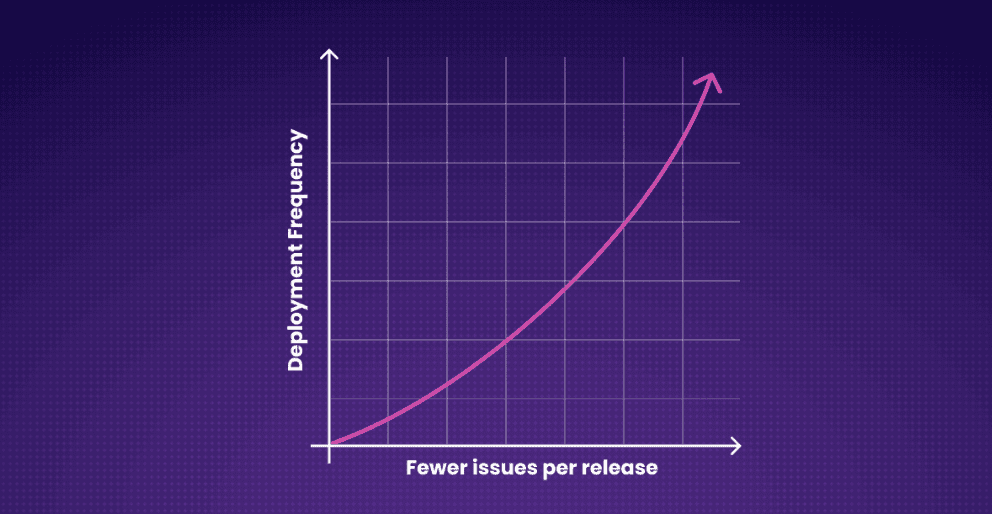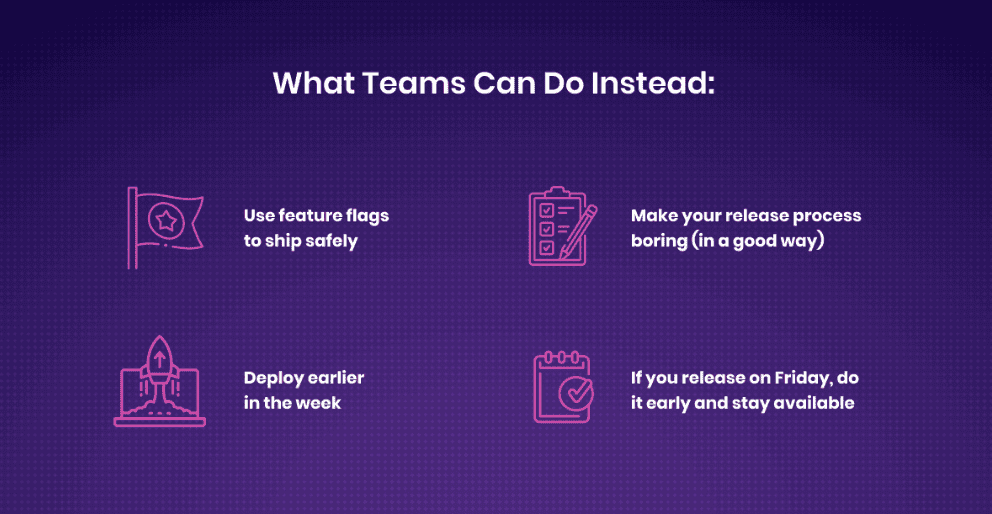- FRIDAY DEPLOYMENT
- DEVOPS
- DEPLOYMENT RISKS
Friday deployment curse. 3 stories when Friday strikes back and some and is it any math correlation?
Sep 2, 2025
-
Emilia Skonieczna
-
8 minutes

Deploying on a Friday is like leaving your kids home alone for the weekend. You stock the fridge, leave some cash on the counter, and tell yourself they'll be just fine.
By Sunday night, there's a hole in the wall, the TV remote is glued to the floor, and somehow the dog has learned to skateboard.
It's not that they couldn't manage. It's just... chaos has a way of sneaking in.
All jokes, of course - but you see the analogy.
There's an unwritten rule: don't release on a Friday. And yet, week after week, we keep doing it - confident that this time everything will be fine. It's not ego, it's hope... and a little bit of Friday optimism.
We ask ourselves - how bad could it be? And the answer usually is - worse than you think.
Over time, Friday deployments gained a reputation. Not because they fail more often, but because when they do, they hit harder - with fewer people online and longer recovery times.
And like all good legends, the bad ones get retold. And the worst part? When something goes wrong on a Friday, it doesn't just start a fire - it burns the whole weekend.
Nobody remembers the Fridays that went fine. But the ones that didn't?
Oh... they'll stick in the memory for a long time.
Pipelines are green, tests are passing, and observability is in place - what could possibly go wrong?
Turns out, timing is everything. Deploying late on a Friday is like starting a home renovation at 4 PM on Christmas Eve. Even the best tools can't save you when everyone's offline, tired, or already thinking about a nap.

The bug isn't the problem. The lack of reaction is. Most bugs can be fixed fast - unless no one sees them. That's why having at least a day to fix things after deployment is more valuable than even the best set of tests.
Weekend deploys fail quietly. Nobody's online. Slack is empty. On-call is asleep. By the time someone sees the alerts, users are already screaming on X. Weekends slow everything down, especially the one thing thing that matters most during an outage: human response.
In 2024, cybersecurity giant CrowdStrike unintentionally triggered one of the largest IT outages in history. A faulty software update crashed millions of Windows systems worldwide, disrupting airports, hospitals, and banks. Recovery took days. The cost? Billions of dollars. source

In 2023, GitLab deployed a configuration change on a Friday morning. What could possibly go wrong?
Apparently, enough to take the platform down for hours. Not exactly the kind of feedback you want at the end of the sprint. Service was eventually restored after a rollback and a few fixes. source

Source: GitLab Forum
In 2025, a low risk code change was released late on Friday. It passed automated tests. It looked safe. And then, things went wrong - fast. Availability dropped, and there wasn't enough time to address it before the weekend kicked in. Feedback from users came quickly, and so did the realization: deploying on Friday still carries risks. source

Source: https://dev.to/francotel/friday-deployments-a-horror-story-4m12
We all know that Friday releases feel risky, but is there actual data to confirm this? Some studies show a clear difference in outcomes - and it's not just gut feeling.
According to Dave Magnot, Friday deployments aren't technically wrong - but they are operationally and socially risky. He points out that even teams with mature DevOps practices should think twice before making changes right before a long offline window, like a weekend.
The DORA report shows a 7.5% change failure rate for elite performers. Magnot's point is simple: if failures still happen - and they do - then timing matters. As previously mentioned: the bug itself isn't the problem, the lack of reaction is.
Industry blog sources suggest a 21% spike in Friday incidents according to PagerDuty, 20% higher Friday PR failure rates according to GitHub, 4-5 times higher disruption risk after Thursday deployments according to Gartner, and weekend incidents that take over 15 minutes longer to resolve according to VictorOps. source
The question of deploying on Fridays isn't about fear or confidence. It's about acknowledging reality: even the best systems fail sometimes, and when they do, it's better to have a fully staffed team around to respond.
Friday deployments aren't forbidden - but they require extra caution, not optimism. source
Teams that deploy frequently, daily or several times a week, usually experience fewer major issues per release. Smaller, regular changes are easier to manage and recover from.
Infrequent deployments, especially late on Fridays, carry more risk. Bigger changes, less practice, and bad timing often lead to surprises and longer downtimes.
Less practice + bad timing = more room for surprises.

Psychologically, a failed Friday deployment feels worse - it ruins the the weekend and sticks in your memory. But logs don't lie: some reports show slightly higher number of incidents on Fridays, but a much worse impact on users over the weekend.
It's not just about memory - it's about the fact that the release process happens when technical support is offline.
Some people say avoid them at all costs, others argue they're fine if done right. The truth is: not every Friday release is bad - but the deployment and development practices around it make all the difference.
Why skipping a release on Fridays makes sense:
reduces the risk associated with limited weekend support
teams are tired by Friday - mistakes are more likely
less chance for things to go wrong when the weekend's already on everyone's mind
But here's the downside:
can slow down progress if teams avoid releasing late in the week
Monday releases often mean larger, riskier deployments
delays don't make issues disappear - they just postpone the risk
It's not just when you release - it's how ready your team is to handle whatever happens next.
Use feature flags to ship safely
Push code to production safely without exposing new features right away. Roll out step by step and control who sees what.
Deploy earlier in the week
Monday-Wednesday gives you time to fix things before the weekend. Friday isn't forbidden - but it's riskier.
Make your release process boring (in a good way)
Automate everything, test thoroughly, monitor constantly. A predictable, repeatable process lowers the risk every day of the week.
If you release on Friday, do it early and stay available
Morning deploys give you time to respond. Never push and log off - someone needs to be ready to react if things break.

If your team deploys daily, monitors everything, and can roll back in second - you're probably good. Strong observability, automation, and real on-call plan make all the difference.
The key? Just treat Friday like any other working day - be fully prepared. That's it.
Deploying on Friday doesn't have to be something scary. Everything depends on preparation. You have on-call ready - you're probably good to go. Just don't confuse confidence with preparation.
The real risk isn't Friday - it's deploying when no one's around to react. Have confidence, but back it up with observability, automation, and a solid incident response plan.

What if deployment didn’t have to be risky? Discover how early deployment and testing let teams deliver faster, safer, and with greater confidence.

Why exactly do startups need DevOps, and when is the right time to implement it? The answers you've been searching for start here.

Discover how telemetry, monitoring, and analysis work together to transmit data from remote sources, optimizing system performance and enhancing application health.